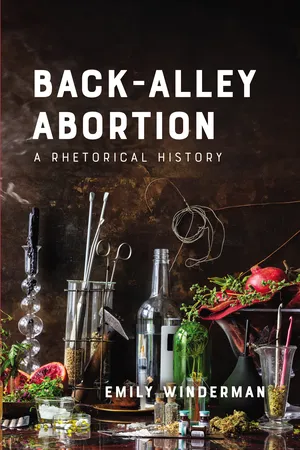
- English
- ePUB (mobile friendly)
- Available on iOS & Android
About this book
Examines how "back-alley abortion" rhetoric shaped public memory, reproductive politics, and advocacy in the fight for abortion rights.
How did three words come to carry the weight of America's abortion debates? In Back-Alley Abortion, Emily Winderman examines how this phrase shaped American reproductive politics and health care standards across generations. Drawing on extensive archival research, the book traces the unexpected origins of this rhetoric in urban reform movements, showing how early associations of alleys with sanitation, morality, and criminality created lasting impressions that would later influence abortion discourse.
Winderman demonstrates how "back-alley abortion" was always more than just descriptive language—it has shaped perceptions of medical legitimacy and clinical spaces. The book reveals how this phrase emerged from racialized and gendered intersections of urban planning, public health, and social reform movements before becoming a rhetoric that anticipated pre–Roe v. Wade criminalized medical encounters. After Roe, back-alley abortion molded public memory through high-profile cases and later became a weaponized tool of anti-abortion activists to restrict access under the guise of sanitary clinical care.
From nineteenth-century urban reformers to contemporary Supreme Court decisions, this study illuminates how three words came to carry the weight of America's most contentious health care debate. In our post-Dobbs era, as states grapple with new restrictions on reproductive rights, understanding the complex history and rhetorical power of "back-alley abortion" has never been more crucial. Drawing on rhetorical theory, reproductive justice theory, and the history of medicine, Back-Alley Abortion offers vital insights into how rhetoric shapes our understanding of medical legitimacy, clinical standards, and health care justice in the United States.
Frequently asked questions
- Essential is ideal for learners and professionals who enjoy exploring a wide range of subjects. Access the Essential Library with 800,000+ trusted titles and best-sellers across business, personal growth, and the humanities. Includes unlimited reading time and Standard Read Aloud voice.
- Complete: Perfect for advanced learners and researchers needing full, unrestricted access. Unlock 1.4M+ books across hundreds of subjects, including academic and specialized titles. The Complete Plan also includes advanced features like Premium Read Aloud and Research Assistant.
Please note we cannot support devices running on iOS 13 and Android 7 or earlier. Learn more about using the app.
Information
Table of contents
- Cover
- Title Page
- Copyright Page
- Dedication
- Contents
- Acknowledgments
- Introduction. “We All Heard the Stories”
- 1 Before Abortion: The Affective Residue of Back-Alley Rhetoric
- 2 The Pre-Roe Back-Alley Rhetorical Medical Encounter
- 3 The Post-Roe Visceral Public Memory of Back-Alley Abortion
- 4 Kermit Gosnell and the Anti-abortion Uptake of Back-Alley Abortion
- Conclusion. (Never) Going Back: The Back-Alley When Abortion Is a Crime
- Notes
- Bibliography
- Index